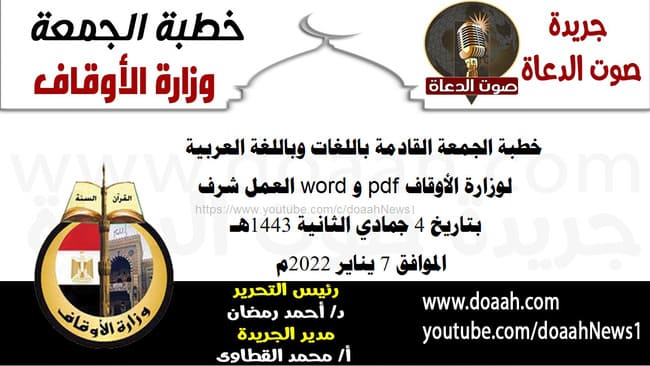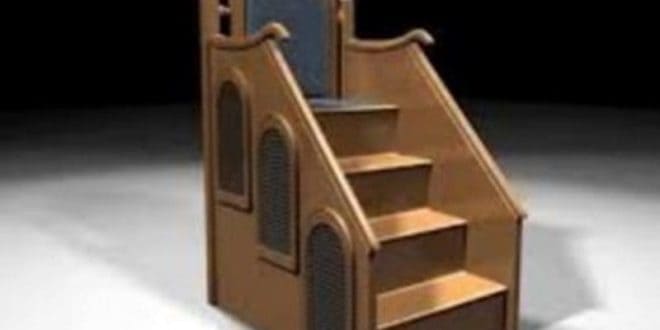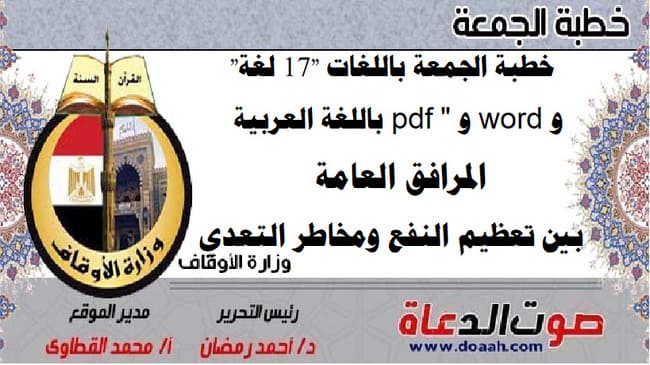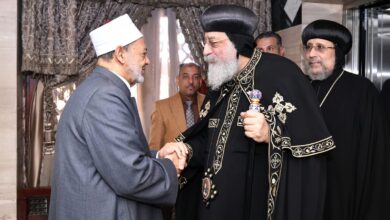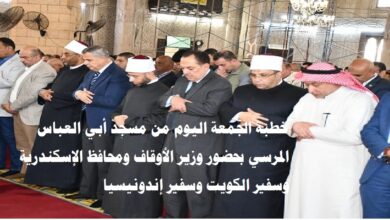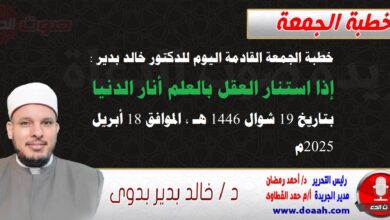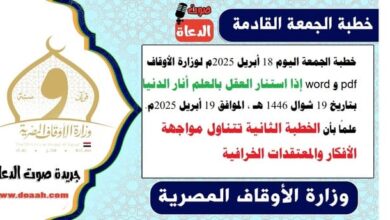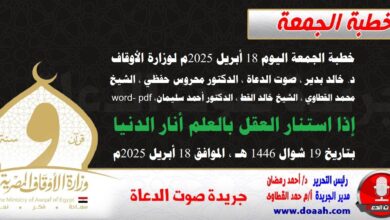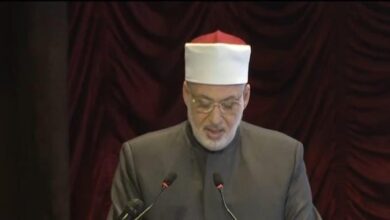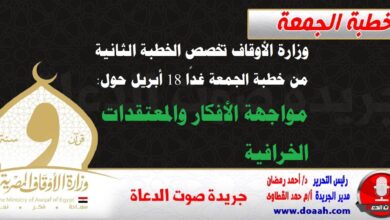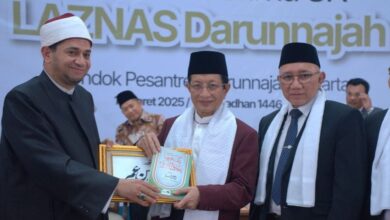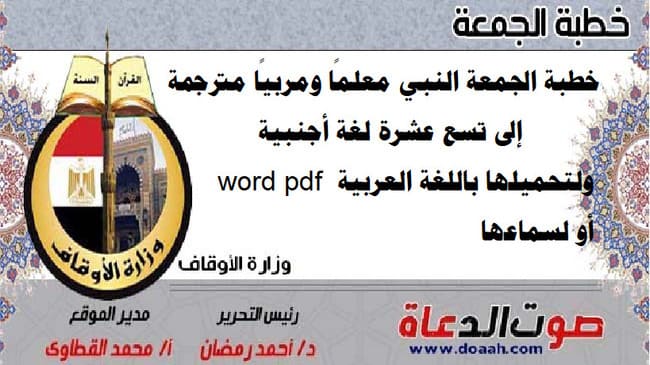Etiquettes, Society Public Rights and their Impact on the Development of the Society

Etiquettes, Society Public Rights and their Impact on the Development of the Society
خطبة الجمعة القادمة لوزارة الاوقاف المصرية: الآداب والحقوق العامة للمجتمع وأثرها في رقيه وبناء حضارته باللغة الإنجليزية بتاريخ 9 ذو القعدة 1440 هـ الموافق 12 يوليو 2019 .
download
word : Etiquettes, Society Public Rights and their Impact on the Development of the Society
pdf : Etiquettes, Society Public Rights and their Impact on the Development of the Society
:video
All praise is due to Allah, the Lord of all worlds, Who says in His Ever Glorious Book, “Say, ‘My Lord has guided me to a straight path, an upright religion, the faith of Abraham, a man of pure faith. He was not a polytheist.’” I bear witness that there is no god but Allah, and that Muhammad is His Servant and Messenger; who said, “My Lord has taught me good manners and He has taught me in the best way.” May Allah’s Peace and Blessings be upon him, his Household, Companions and upon those who follow their path to the Day of Judgment.
Islam has come with an integrated approach that regulates man’s relationship with his Lord, other people, and the whole universe. The Islamic Shari’ah is rich with many etiquettes and good manners that contribute to the progress and prosperity of the society. From these manners is: The etiquettes of seeking permission to enter a place. Islam has ordered us to seek a permission making this etiquette a means to protect people’s privacy, as the Almighty Allah says, “Believers, do not enter other people’s houses until you have asked permission to do so and greeted those inside- that is best for you: perhaps you will bear this in mind.” The Prophet (PBUH) taught us the etiquettes of seeking permission, including starting with salutation and then mentioning your name. Once, a man asked the Prophet’s permission (to enter the house). When he was in the house, he said: May I enter? The Prophet (PBUH) said to his servant: Go out to this (man) and teach him how to ask permission to enter the house, and say to him: “Say: Peace be upon you. May I enter?” The man heard it and said: Peace be upon you! May I enter? The Prophet (PBUH) permitted him and he entered. Also, Jabir narrated that, “Once, I sought permission to enter upon the Prophet (PBUH), so he said: ‘Who is this?’ I said: ‘Me.’ The Prophet replied, “Me, me!’It seemed that he disliked that.”
Also, from the ettiquetes of seeking permission is to lower one’s gaze and not to look inside the house. The Prophet (PBUH) said, “Seeking permission to enter (somebody’s house) has been prescribed in order to restrain the eyes (from looking at something we are not supposed to look at).” Also, Sa’d Ibn Ubadah narrated that once he sought permission to enter a house while he was standing in front of the door, so the Prophet (PBUH) said to him “when you seek permission to enter a house, do not stand in front of the door.” It is reported that whenever the Prophet wanted to seek a permission to enter a house, he would not stand in front of the door. Rather, he would stand to the right of the left side.
Another moral that Islam urged us to have is: the etiquettes of streets and public places: Islam stated that there are etiquettes that must be followed in streets. The Prophet (PBuh) said, “Avoid sitting by the road side.” The people then said, “O Allah’s Messenger, we cannot do without those meeting places in which we converse.” So he (PBUH) said, “If you have to sit at all, then fulfil the road its due rights.” They asked, ‘What are the road’s due rights?’ He replied, “Keeping the eye downward (so that you may not stare at the women), refraining from doing harm to the other and exchanging mutual greetings, and commanding the good and forbidding the evil.”Also, the Prophet (PBUH) said, “Faith has over seventy branches – or over sixty branches – the uppermost of which is the declaration that none has the right to be worshipped but Allah; and the least of which is the removal of harmful objects from the road, and modesty is a branch of faith.”
Thus, one who uses the road or public facilities, should not speak loudly, annoy others, laugh openly or throw rubbish in streets. Rather, he has to put rubbish in the specified places. Also, he should not busy the roads or harm the bystanders, either through verbal or actual harassment.
Also, from the good manners is cleanliness. Islam made cleanliness and purification of the body, clothes and places an integral part of its rulings, for being intrinsic human nature and civilizational values. This is why Islam urged people to adopt a number of good manners that keeps one’s appearance good and pleasing. Allah praised those to keep themselves clean saying, “God loves those who turn to Him, and He loves those who keep themselves clean.” Also, the Prophet (PBUH) said, “Indeed Allah is good and he loves what is good; and He is clean and He loves cleanliness…” He (PBUH) also said, “Purity is half of faith…’ Once, He (PBUH) saw a dishevelled man whose hair was untidy. He said: Could this man not find something to tidy his hair? He saw another man wearing dirty clothes and said: Could this man not find something to wash his garments with.”
The Prophet (PBUH) also urged people to clean their teeth in order to keep a good smell of their mouths and not to harm others. He(PBUH) said, “Had I not thought it difficult for my followers, I would have commanded them to use the siwak (tooth-stick) before every Prayer.”
These manners also include the etiquettes of dialogue. Dialogue is one of the means of developing acquaintance with others and correcting concepts. Islam has opened the door to dialogue among all peopl as a way to reach the truth without and any restriction or coercion. However, such dialogue should be away from taunting others, mocking them, or despising them. The Almighty Allah said, “And argue with them in the best manner.” and said, “[Prophet], tell My servants to say what is best.”Also, the Prophet said, “A true believer does not taunt or curse or abuse or talk indecently.” Thus, dialogue should be based on objective and authentic foundations that take the current circumstances into consideration.
These manners also include: to ascertain the authenticity of any news. Allah said, “Believers, if a troublemaker brings you news, check it first, in case you wrong others unwittingly and later regret what you have done.” The Prophet (PBUH) said, “Deliberation comes from Allah and Haste comes from Satan.” In another Hadith he (PBUH) said, “Deliberation should be in everything except in the actions of the next world.” He also said, “It is an enough sin for a man to relate everything he hears.” This includes to avoid narrating rumors or speaking about them, as this leads to promoting them.Allah said, “That you took it up with your tongues, and say with your mouths things you did not know [to be true], thinking it was trivial, but to God, it was very serious.” and The Prophet said, “He who believes in Allah and the Last Day let him not harm his neighbour; and he who believes in Allah and the Last Day let him show hospitality to his guest; and he who believes in Allah and the Last Day let him speak good or remain silent.”
Also, Lowering the Voice is one of the general etiquettes laid down by Islam. It means that man should not raise his voice beyond what is usual, especially in the presence of those who are of a higher position. The Quran records Luqman’s pieces of advice to his son, “And be moderate in your pace and lower your voice; indeed, the most disagreeable of sounds is the voice of donkeys.” Allah, the Almighty, also praises those who lower their voices, especially in the Prophet’s presence. He, the Almighty, says: “Indeed, those who lower their voices before the Messenger of Allah – they are the ones whose hearts Allah has tested for righteousness. For them is forgiveness and great reward.”
Guiding the Lost is also one of these etiquettes; it means guiding him to the right direction through description or sending someone to guide him. Prophet Muhammad (PBUH) said: “Beware of sitting on roads (ways).” The people said: “We have but them as sitting places.” Messenger of Allah (PBUH) said, “If you have to sit there, then observe the rights of the way”. They asked, “What are the rights of the way?” He (PBUH) said, “To lower your gaze (on seeing what is illegal to look at), and (removal of harmful objects), returning greetings, enjoining good, forbidding wrong and guiding the lost.”
With that said, I ask Allah to forgive me and you
All praise is due to Allah, Lord of the Worlds; I bear witness that there is no god but Allah; I bear witness that our Master Muhammad is His Slave and Messenger; may Allah’s Peace and Blessings be upon him, his family, companions and whoever follows his guidance to the Day of Judgment.
Muslim brothers:
There are other etiquettes and manners that Muslims should adhere to, including helping the needy which is considered as one of the most important and sublime acts in Islam. Abu Dharr (may Allah be pleased with him) narrated that the Messenger of Allah (PBUH) said: “In the morning charity is due from every bone in the body of every one of you.” The Companions replied, “How can we bring forth all of these (numbers of) charity, O Messenger of Allah?” He (PBUH) said: “The doors to good are many, including glorification of Allah, praising Him, saying “Allah is Great”, saying “there is no god deserved to be worshipped but Allah”, enjoining good, forbidding evil, removing harm from the road, conveying the message to deaf, guiding the blind, (helping people to) meet their needs, exert your utmost with those in dire need, and give aid to the weak as far as you can; all of these are acts of charity for yourself.” (Sahih Ibn Hibban)
The list of these etiquettes and manners also include giving hand to the weak and those of special needs. It goes without saying that social integration achieves the interest of the rich more than that of the poor, as it established balance in life. This is supported by Imam ‘Ali’s (may Allah be pleased with him) statement, “Allah, the Almighty, assigned particular portions in the rich’s properties as the provision of the poor; so if the poor get hungry, this will be the result of the rich’s misery, and Allah will for sure hold them accountable for that.” In truth, this care means a lot since it is viewed as a due right for the poor on the society. Allah, the Almighty, is near to those people with broken hearts and shows mercy to those who are merciful to His slaves, which is why a Muslim should not belittle any good deed even if it is a good word. Prophet Muhammad (PBUH) said: “Do not consider any act of goodness as being insignificant even if it is meeting your brother with a cheerful face” and “You gain no victory or livelihood except through (the blessings and invocations of) the poor amongst you”; for Allah helps the one who helps his brother.
The list further includes showing respect to the elder; a point which is realized through dignifying him and not to humiliate him, for his old age and precedence to Islam should be taken into account. The elder should, on the other hand, be merciful and compassionate to the young. Prophet Muhammad (PBUH) said: “If a Muslim respects an old man, Allah will provide him with someone who shows respect to him when he gets old.” This actually shows how Islam is merciful, tolerant and just, to the extent that Prophet Muhammad (PBUH) stated clearly that showing respect to the elder, memorizers of the Qur’an and fair rulers are different forms of glorifying Allah, the Almighty, “Glorifying Allah involves showing honor to a grey-haired Muslim and to one who can expound the Qur’an, but not to one who acts extravagantly regarding it, or turns away from it, and showing honor to a just ruler.” He (PBUH) also said: “He is not one of us who does not have mercy upon our young, respect our elders, and command good and forbid evil”.
The correct understanding of the tolerance of Islam indicates that showing respect is not confined only to Muslims of old age, for it has been narrated that the Messenger of Allah (PBUH) has given charity to a Jewish family. Also, ‘Umar Ibn ‘Abd Al-‘Aziz is reported to have written to his governor in Basra saying, “search for the old, weak and poor from among the people with whom we have covenants, and give them out from the Muslim House of Treasury what meets their needs.”
Society’s members shall take care of its general interests; this is one of the society’s due rights upon its members. If we take the issue of overpopulation as an example, we have to highlight two points: first: some people consider their financial ability only, not paying any attention to the material and educational ones, as well as all kinds of care. It is not also the individual ability of the member that shall be considered; rather it goes far beyond that to capabilities of countries that shoulder the responsibility of providing the services that cannot be provided by the individuals of the society, which means that the condition and capability of the State is one of the most important factors that should be taken into account as far as population is concerned. It is true that he deserves not to live that person who wants to live for the sake of himself alone. So, uncontrolled overpopulation exerts bad impact not only on the individuals or the family but also on those countries that do not consider the findings of science in addressing the problem of overpopulation.
Second: few but strong people are better than the many but weak people referred to by the Prophet (PBUH) as “the scum”. That is because the uncontrolled population may result in extraordinary conditions that in turn hinder some countries from providing the basics of health, education and infrastructure; it also leads us to look like the scum. In fact, a man with sound intellect realizes that the most essential point is relating to the how-know. At that point, we can clearly state that the few but strong people are one thousand times better than the many but weak ones.
That is because in case large numbers of people do not cause but weakness, ignorance, backwardness and which are but heavy burden on the state, it is but as d
___________________________________
للمزيد عن مسابقات الأوقاف و مسابقة الأوقاف لحفظ القرآن الكريم
للإطلاع علي قسم خطبة الجمعة القادمة
للإطلاع علي قسم خطبة الجمعة القادمة باللغات
للإطلاع ومتابعة قسم خطبة الأسبوع


